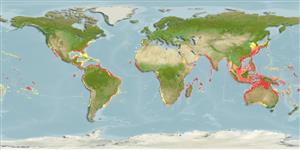Common names from other countries
>
Carangiformes (Jacks) >
Carangidae (Jacks and pompanos) > Naucratinae
Etymology: Seriola: Latin word diminutive with the meaning of a large earthenware pot (Ref. 45335).
More on author: Valenciennes.
Environment: milieu / climate zone / depth range / distribution range
экология
морской ассоциированный с рифами; пределы глубины 5 - 245 m (Ref. 90102), usually 30 - 35 m (Ref. 40849). Subtropical; 43°N - 38°S, 180°W - 180°E
Circumglobal. Indo-West Pacific: Kenya south to South Africa (Ref. 3287) and east to Mariana and Wake islands in Micronesia, north to the Ryukyu Islands, south to New Caledonia and the Kermadec Islands (Ref. 8879). Absent from the Red Sea and French Polynesia. Likely at Seychelles (Ref. 1623). Eastern Pacific: USA to Peru, including Galapagos Islands (Ref. 2850). Western Atlantic: Cape Cod, USA to northern Argentina (Ref. 9626). Distribution in the eastern Atlantic is not well established. Recently recorded from Lampedusa Island in the Mediterranean (Ref. 47878).
Size / Вес / Возраст
Maturity: Lm ? range ? - ? cm
Max length : 160 cm FL самец/пол неопределен; (Ref. 40637); common length : 90.0 cm TL самец/пол неопределен; (Ref. 5450); наибольший вес (опубликованные данные): 59.9 kg (Ref. 40637)
колючие лучи спинного плавника (общее число) : 8; членистые (мягкие) лучи спинного плавника (общее число) : 27 - 33; колючие лучи анального плавника: 3; членистые (мягкие) лучи анального плавника: 18 - 22; позвонки: 24. This species is distinguished by the following characters: upper jaw posterior very broad, extends to level of middle of pupil; gill rakers (excluding rudiments) decreasing slightly in number with growth, 6-9 + 18-20 = 24 -29 in 2-7 cm FL individuals, but 22-26 in fish larger than 20 cm FL; length of dorsal-fin lobe about 1.3 to 1.6 times longer than pectoral fins and 18 to 22% of fork length; caudal peduncle with dorsal and ventral grooves present; first pterygiophore of anal fin straight in specimens larger than about 10 cm fork length. Colour: dorsal brown or silvery blue-green to olivaceous, ventral paler or silvery with brassy or lavender reflections, with yellow midlateral stripe usually present, and an oblique, dark yellowish brown band from nape through eye to edge of upper lip, the nuchal bar often persistent in adults (may be absent); juveniles (2-18 cm fork length) with dark nuchal bar and 6 dark body bars, each with a light narrow irregular area through their centre vertically, that do not extend into the membranes of the second dorsal and anal fins, and a seventh bar at the end of caudal peduncle; fins dark or yellowish grey except pelvic fins, white ventrally (Ref. 9894, 90102).
Adults are benthopelagic in outer reef slopes and offshore banks to 160 m or more. They form small groups (Ref. 9283, 26235, 58302). Young often seen around floating objects (Ref. 4887, 48635). They feed mainly on fishes, but also on invertebrates. Eggs are pelagic (Ref. 4233). Marketed fresh and salted or dried (Ref. 9283). May cause ciguatera poisoning, particularly in coral reef areas (Ref. 5217). Uncommon on East Indian reefs but occasionally found in cool upwelling areas of Lesser Sunda Islands of Indonesia (Ref. 90102).
Life cycle and mating behavior
Maturities | размножение | Spawnings | Egg(s) | Fecundities | личинки
Myers, R.F., 1991. Micronesian reef fishes. Second Ed. Coral Graphics, Barrigada, Guam. 298 p. (Ref. 1602)
Статус Красного Списка МСОП (Ref. 130435)
CITES (Ref. 128078)
Not Evaluated
Угроза для людей
Reports of ciguatera poisoning (Ref. 5217)
Использование человеком
рыболовство: коммерческий; объект спортивного рыболовства: да
дополнительная информация
инструменты
Специальные отчеты
Скачать в формате XML
ресурсы в Интернет
Estimates based on models
Preferred temperature (Ref.
115969): 22.1 - 28.6, mean 27.3 (based on 201 cells).
Phylogenetic diversity index (Ref.
82804): PD
50 = 0.5020 [Uniqueness, from 0.5 = low to 2.0 = high].
Bayesian length-weight: a=0.01862 (0.01118 - 0.03101), b=2.92 (2.77 - 3.07), in cm Total Length, based on LWR estimates for this species & (Sub)family-body (Ref.
93245).
Trophic level (Ref.
69278): 4.5 ±0.7 se; based on diet studies.
устойчивость к внешним воздействиям (Ref.
120179): низкий, минимальное время удвоения популяции 4.5-14 лет (Preliminary K or Fecundity.).
Fishing Vulnerability (Ref.
59153): Very high vulnerability (90 of 100).
